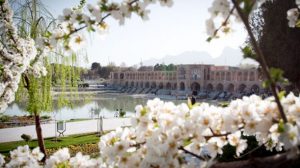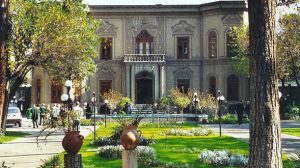We begin tonight’s edition of A Window to the Fatherland with Dr. Alireza Nourizadeh reading one of his poems from the book of his collected works.
Dr. Alireza Nourizadeh:
In tonight’s program we have the pleasure of the economist Dr. Manouchehr Farahbakhsh being with us to get his insight into the roots of Iran’s economic woes during the last Persian year and what the future holds for it.
Dr. Manouchehr Farahbakhsh:
In fact Iran’s economy during the last year was very much the continuation of its previous years where no fundamental changes took place in it. Iran’s economy suffers from the lack of stability. In a stable economy you can control inflation and plan for progress and economicrewards.
The stability of Iran’s economy was shattered by the Islamic revolution in 1979. During the previous regime we had solid andstable economic foundations for the country. Inflation and price rises had been controlled and there were plans for progress and prosperity. The reason forthis stability was the stability of the system that looked after the country’s economy as the basis of social development of the nation.
However, after the revolution, the new regime literally began an onslaught on four major sources of Iran’s economicfoundations. They were the oil industries, the national army, the manufacturing industries and the banking system.
In the oil sector the regime cancelled all the country’s contracts with foreign companies. In the army, all its top brass were executed and purged. The manufacturing was abandoned and the banking systemcollapsed. In short, the very economic system that exited in the country under the Shah’s rule was destroyed so that the traditional bazzari merchants with links to the new religious establishment could take over and benefit from it.
When you wreak havoc in the stability of your economic system, you must await its devastating consequences.
We have now reached the stage of complete disintegration and collapse of the system. And it is not just the economic system of the country that has collapsed, with it the social fabric of Iran has come apart with corruption, thefts, embezzlement, poverty, prostitution, depression, separations, drug addiction and every imaginable calamity that can befall on a human society.
Dr. Alireza Nourizadeh:
I believe Hassan Rouhani is trying to mend thissituation with meager measures. He is riding on a broken wagon that instead of going forward is stranded in the mud. But the question is when this wagon will be completely engulfed and drowns.
Dr. Manouchehr Farahbakhsh:
We have another major problem in Iran and that is Khamenei’s resistance and personal opposition to any meaningful economic reforms because he is against the free market economy while he knows nothing about economic laws and is accountable to nobody for his ill conceived “proposals”.
Further more, his household runs all the so-called charities that have a parasitic role in Iran’s economy.
Dr. Alireza Nourizadeh:
With what right Ghassem Soleimani of the Revolutionary Guard has given 3.5 million Euros to Hamid Baghaie, Ahmadinejad’s former deputy? How could these people handle so much of the country’s wealth among themselves with no accountability?
Dr. Manouchehr Farahbakhsh:
As far as I know, there is a company in Switzerland that has very close links with Ghassem Soleimani’s military base and handles these monies for him.
Dr. Alireza Nourizadeh:
The economic disaster in our country began when the mullahs left their mosques and turned into merchants with Khamenei’s despotism protecting their undeserved wealth gained through corruption.
Dr. Manouchehr Farahbakhsh:
For Khamenei the best defence is to attack. Histalk of supporting the national manufacturing firms and banning the import of foreign products cuts no ice with the realities of Iran’s economic mess. He does not believe the collapse of Iran’s economy until it crashes onto his head.







Add Comment